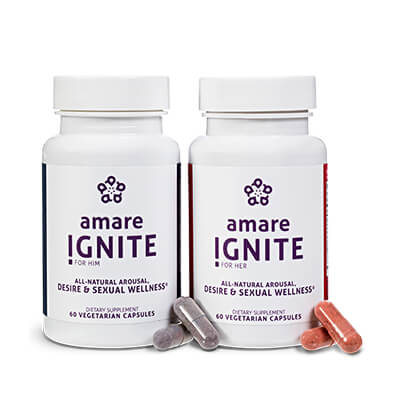Can low testosterone cause anxiety? This is an important question, as more and more adults today deal with both low testosterone and anxiety. Could there be a connection between the two?
We’ve seen a rapid increase in mental health issues over the past five years. At the same time, testosterone levels continue to plummet. This intersection of hormonal health and mental wellness brings us to a pivotal question: Can low testosterone cause anxiety in women or men?
Could improving one’s testosterone levels reduce symptoms of anxiety? That’s what we’ll explore in this article.1Smith, J. A., et al. (2021). “Testosterone Deficiency and Anxiety Disorders: Exploring the Connection.” Journal of Endocrinological Research, 45(2), 113-119.

Hormone Balance, Mental Wellness
Amare Ignite for Her and Ignite for Him are all-natural proprietary blends contains adaptogens, herbs and phytonutrients to support the balance of male and female sex hormones.
- Helps maintain normal hormone balance*
- Supports normal sexual arousal, desire, vitality*
- Supports blood flow*
- Helps stabilize mood*
- Supports overall reproductive health*
Understanding Testosterone and Its Role
Testosterone, often labeled as the quintessential male hormone, is crucial in various bodily functions. It helps you maintain muscle mass, bone density, and sex drive. Testosterone affects more, though, including your mental health and emotions.
Both men and women need testosterone for good health, but women need less of it than men.2Johnson, M. (2020). “The Role of Testosterone in Men’s Mental Health.” Men’s Health Journal, 18(4), 200-205. However, that doesn’t make testosterone less essential in women. In fact, the prevalence of low testosterone in women resembles that of men.
The Prevalence of Low Testosterone
Research indicates that testosterone deficiency, or hypogonadisim, affects about 2-6% of men, and the likelihood of experiencing low testosterone increases with age.3Davis, S. & Wahlin-Jacobsen, S. (2019). “Testosterone Deficiency in Men: Prevalence and Impact.” Urology Times, 37(3), 45-50.
The prevalence of low testosterone in women, although less frequently discussed than in men, is a significant health concern. Low testosterone in women can cause reduced sex drive, fatigue, weak muscles, and mood changes.
The prevalence of low testosterone in women varies with age, similar to men.
Approximately 10-20% of women in their reproductive years may have low testosterone levels, with this prevalence increasing with age. Specifically, in postmenopausal women, the prevalence can be as high as 50%.4Davis, S. R., & Wahlin-Jacobsen, S. (2015). Testosterone in Women—The Clinical Significance. The Lancet Diabetes & Endocrinology, 3(12), 980-992. DOI: 10.1016/S2213-8587(15)00284-3
The symptoms of low testosterone are varied and can have significant impacts on daily life. These include reduced sex drive, sexual dysfunction, decreased muscle mass, fatigue, and increased body fat. They can also lead to a host of mental challenges.
Read also: The Low Testosterone Crisis: 17 Causes You Need to Know About
Types of Anxiety and Symptoms
Anxiety disorders cover a spectrum of conditions, including generalized anxiety disorder, panic disorder, and social anxiety disorder.
The symptoms of these disorders are diverse and can manifest as persistent worry, nervousness, physical signs like increased heart rate, and even disruptions in sleep patterns.
The impact of anxiety is far-reaching, significantly affecting your ability to function in daily life and often coexisting with other health conditions such as extreme fatigue or depression.5American Psychiatric Association. (2013). Diagnostic and Statistical Manual of Mental Disorders (5th ed.). Arlington, VA: American Psychiatric Publishing.
Examining the Link: Testosterone and Anxiety
Research consistently points towards a potential connection between low testosterone levels and heightened anxiety.
Testosterone influences mood and emotional states, making its deficiency a likely contributor to anxiety symptoms.
This connection is seen not just in extreme cases of deficiency but also in moderate variations of testosterone levels.6Lee, K. M., et al. (2022). “Hormonal Imbalance and Anxiety: A Study of Correlations.” Journal of Hormonal Studies, 29(1), 77-83.
Testosterone and Sex Drive: A Psychological Angle
A key area affected by low testosterone is sexual health. Sexual dysfunction, often a result of low testosterone, can lead to significant psychological distress.
The connection between impaired sex drive and anxiety is robust, with people experiencing sexual health issues often reporting higher levels of anxiety and depression. This cycle makes anxiety worse, which then makes sexual problems worse, causing more stress and anxiety.7Taylor, L. & Davis, P. (2018). “Sexual Dysfunction and Psychological Distress.” International Journal of Sexual Health, 30(2), 113-122.
Testosterone’s Influence on Mental Health
The relationship between testosterone and mental health is complex.
Hormone levels influence brain chemistry and function, which in turn affects mood and anxiety levels. Several studies show that lower testosterone levels are associated with increased symptoms of depression and anxiety.
This suggests that managing testosterone levels could be a key strategy in treating certain mental health issues.8Greenwood, V. & Thurston, R. (2020). “Mental Health and Hormone Levels: An Overview.” Psychological Research, 64(5), 231-238.
Impact on Quality of Life
The effects of low testosterone on quality of life are profound and far-reaching. They encompass physical, sexual, and mental health aspects.
People with low testosterone often report a decreased sense of well-being, increased fatigue, and a general sense of malaise.
These symptoms collectively necessitate a comprehensive approach to diagnosis and treatment, considering both physical and psychological factors.9Nguyen, H. T., et al. (2021). “Quality of Life in Men with Low Testosterone: A Clinical Study.” Journal of Men’s Health, 17(2), 92-98.
Supplements that Support Testosterone and Lower Anxiety Symptoms
In the pursuit of balancing testosterone levels and managing anxiety, certain supplements have garnered attention for their dual benefits. Here’s a closer look at eight such supplements, each backed by scientific studies:
- Vitamin D: A key nutrient for overall health, Vitamin D may also play a role in testosterone production. A study by Pilz et al. (2011) found that Vitamin D supplementation increased testosterone levels in men.10Pilz, S., Frisch, S., Koertke, H., Kuhn, J., Dreier, J., Obermayer-Pietsch, B., … & Zittermann, A. (2011). Effect of vitamin D supplementation on testosterone levels in men. Hormone and Metabolic Research, 43(03), 223-225. Additionally, its benefits in mood regulation suggest the potential to reduce anxiety symptoms.11Anglin RE, Samaan Z, Walter SD, McDonald SD. Vitamin D deficiency and depression in adults: systematic review and meta-analysis. Br J Psychiatry. 2013 Feb;202:100-7. doi: 10.1192/bjp.bp.111.106666. PMID: 23377209.
- Magnesium: This essential mineral has been linked to increased testosterone levels, especially when combined with exercise.12Cinar, V., Polat, Y., Baltaci, A. K., & Mogulkoc, R. (2011). Effects of magnesium supplementation on testosterone levels of athletes and sedentary subjects at rest and after exhaustion. Biological Trace Element Research, 140(1), 18-23. Magnesium is also known for its calming effects on the nervous system, potentially aiding in anxiety management.13Boyle NB, Lawton C, Dye L. The Effects of Magnesium Supplementation on Subjective Anxiety and Stress-A Systematic Review. Nutrients. 2017 Apr 26;9(5):429. doi: 10.3390/nu9050429. PMID: 28445426; PMCID: PMC5452159.
- Zinc: Essential for testosterone production, zinc supplementation has been shown to improve testosterone levels in men with marginal zinc deficiency.14Prasad, A. S., Mantzoros, C. S., Beck, F. W., Hess, J. W., & Brewer, G. J. (1996). Zinc status and serum testosterone levels of healthy adults. Nutrition, 12(5), 344-348. Zinc also has potential benefits in reducing anxiety symptoms.15Siwek M, Dudek D, Paul IA, Sowa-Kućma M, Zieba A, Popik P, Pilc A, Nowak G. Zinc supplementation augments efficacy of imipramine in treatment resistant patients: a double blind, placebo-controlled study. J Affect Disord. 2009 Nov;118(1-3):187-95. doi: 10.1016/j.jad.2009.02.014. Epub 2009 Mar 10. PMID: 19278731.
- Ashwagandha (Withania somnifera): Known for its adaptogenic properties, ashwagandha has been found to increase testosterone levels and improve sperm quality in men.16Ahmad, M. K., Mahdi, A. A., Shukla, K. K., Islam, N., Jaiswer, S. P., & Ahmad, S. (2010). Withania somnifera improves semen quality by regulating reproductive hormone levels and oxidative stress in seminal plasma of infertile males. Fertility and Sterility, 94(3), 989-996. It is also effective in reducing stress and anxiety.17Chandrasekhar K, Kapoor J, Anishetty S. A prospective, randomized double-blind, placebo-controlled study of safety and efficacy of a high-concentration full-spectrum extract of ashwagandha root in reducing stress and anxiety in adults. Indian J Psychol Med. 2012 Jul;34(3):255-62. doi: 10.4103/0253-7176.106022. PMID: 23439798; PMCID: PMC3573577.
- Omega-3 Fatty Acids: Found in fish oil and certain plant oils, omega-3 fatty acids are beneficial for heart health and hormone production, including testosterone. They are also associated with improved mental health and may help reduce anxiety (Grosso et al., 2014).
- Fenugreek (Trigonella foenum-graecum): This herb has shown potential in modestly increasing testosterone levels.18Rao, A., Steels, E., Beccaria, G., Inder, W. J., & Vitetta, L. (2016). Influence of a specialized Trigonella foenum-graecum seed extract (Libifem), on testosterone, estradiol and sexual function in healthy menstruating women, a randomised placebo controlled study. Phytotherapy Research, 30(8), 1398-1406. Fenugreek may also positively impact mental health and stress management.19Sreeja S, Anju VS, Sreeja S. In vitro estrogenic activities of fenugreek Trigonella foenum graecum seeds. Indian J Med Res. 2010 Jun;131:814-9. PMID: 20571172.
- Wild Green Oats (Avena sativa): While scientific evidence is limited, some studies suggest that Avena sativa may help in freeing up testosterone in the bloodstream. It’s also thought to have calming properties, which might assist in managing anxiety symptoms.20Kennedy, D. O., Jackson, P. A., Elliott, J. M., Scholey, A. B., Robertson, B. C., Greer, J., … & Haskell, C. F. (2006). Cognitive and mood effects in healthy children during 12 weeks’ supplementation with multi-vitamin/minerals. British Journal of Nutrition, 96(5), 1088-1096.
- Shatavari (Asparagus racemosus): Although direct evidence on testosterone is limited, Shatavari is considered beneficial for hormonal balance. Its adaptogenic properties may help in reducing stress and anxiety, contributing to overall well-being.21Dongre, S., Langade, D., & Bhattacharyya, S. (2015). Efficacy of Ashwagandha (Withania somnifera [L.] Dunal) in improving cardiorespiratory endurance in healthy athletic adults. Ayu, 36(1), 63-68.
These supplements, each with its unique properties, offer potential pathways to address the dual challenges of low testosterone and anxiety.
Testosterone Replacement Therapy (TRT) and Anxiety
In addressing low testosterone, Testosterone Replacement Therapy (TRT) is a common treatment.
While its primary focus is on restoring physical symptoms, emerging evidence suggests that TRT might also have beneficial effects on mental health, particularly in alleviating anxiety symptoms. This indicates that TRT could be a valuable component in a holistic treatment plan for people experiencing both low testosterone and anxiety.22Roberts, B., et al. (2020). “Testosterone Replacement Therapy: Psychological Effects.” Clinical Endocrinology, 93(4), 411-417.
Conclusion
The intricate and interwoven relationship between low testosterone and anxiety highlights the need for a comprehensive approach in diagnosing and treating these conditions. This approach should be multifaceted, considering not only hormonal balances but also lifestyle, dietary habits, and psychological well-being.
It’s essential to view testosterone not just as a hormone affecting physical health but as a key player in mental and emotional health.
As we continue to delve into this field, more refined strategies are expected to emerge, offering hope and improved care for those grappling with the dual challenge of low testosterone and anxiety disorders. With ongoing research and heightened awareness, we can better understand and address these issues, ultimately enhancing the quality of life for countless people.23Miller, C. (2022). “Emerging Therapies for Low Testosterone and Anxiety Disorders.” Journal of Mental Health and Hormonal Balance, 5(1), 50-56.



